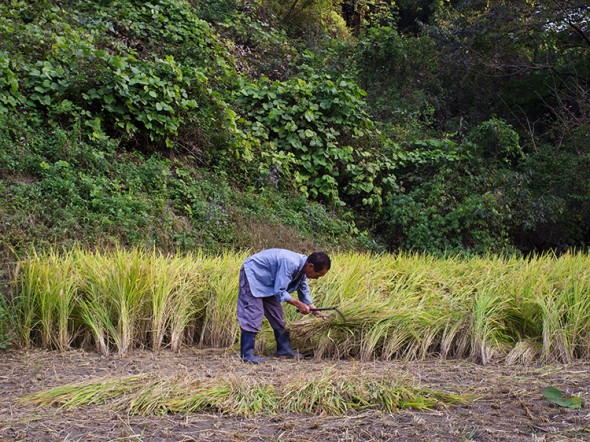South Korea’s rice farmers prepare for rough ride from free trade

Financial Times | June 29, 2014
South Korea’s rice farmers prepare for rough ride from free trade
By Simon Mundy in Pyeongtaek, South Korea
Lee Sang-gyu is a struggling rice farmer who fears his lot is about to get even worse as South Korea – with its long tradition of strict import quotas – prepares to dismantle its protectionist policies.
The protected status of homegrown rice has long been immune from question in East Asia, where Japan slaps a near-800 per cent tariff on imports and Seoul’s quotas limit shipments into South Korea to 408,700 tonnes this year, or about 8 per cent of national consumption. That makes rice a rare blot on South Korea’s copybook after a decade of energetic liberalisation.
But that is set to change this year as a 1993 agreement with the World Trade Organisation expires – a prospect that has sent ripples through South Korea’s paddy fields and left thousands of farmers like Mr Lee fretting for their livelihoods.
Mr Lee claims that there has been a big hit to market prices even from the limited imports allowed so far – adding to the impact of a gradual decline in rice consumption as consumer tastes diversify away from the traditional staple.
“It’s getting worse, bit by bit,” he says. Mr Lee’s earnings from his business near Pyeongtaek, 60km south of Seoul, fell to $35,500 last year from $45,000 in 2011. “I have to keep expanding the area I farm, just to get by,” he says.
Since 2003 South Korea has signed a string of trade agreements with partners including the US, the EU, and the Association of Southeast Asian Nations. It is now pursuing entry to the US-led Trans-Pacific Partnership group, as well as a trade pact with China, by far its biggest trade partner.
But the liberalisation drive has proved fiercely controversial. The US trade agreement, for example, prompted street protests and one lawmaker even set off a tear gas canister in parliament, in an attempt to stop its ratification. The debate on the rice quota has been one of the most sensitive trade issues under the government of Park Geun-hye, who took power last year.
In its latest review of South Korea in 2012, the WTO argued that the import quota had pushed up the cost of rice in the country, which it said was 1.6 times average world price levels in 2010.
Meanwhile, the level of financial support for farmers is 2.5 times the OECD average, at about 2 per cent of gross domestic product, according to a report by the rich-country group.
This is not enough to satisfy Lee Jong-hyuk, head of policy at the progressive Korean Peasants’ League. “The government is gradually reducing support for farmers,” he says. “It will open up the rice market. It seems like other opinions are not reflected in its decision-making process.”
The agriculture ministry denied this, saying that it had undertaken extensive consultation with farmers, and that no decision had yet been taken.
Mr Lee wants the government to negotiate an extension to the quota arrangement – as the Philippines did earlier this month. But experts at the agriculture ministry’s public consultations have suggested an alternative option: opening the market while increasing import tariffs from the current 5 per cent to levels as high as 300-500 per cent.
“This is the only way to protect the domestic rice industry. It’s better than increasing the quota,” says Song Joo-ho, a researcher at the Korea Rural Economic Institute.
However, others warn that such punitive tariffs could strain relations with rice exporters – notably China and the US, which last year accounted for 53 per cent and 33 per cent of South Korean rice imports.
Seoul is hoping to sign a trade pact with China this year, and to win US support for its entry into the TPP group. Yet US exporters have protested against South Korean customs checks that have thrown into question their ability to benefit from the trade agreement between the two countries.
This prompted an apparent warning in April by US President Barack Obama that the issue could affect South Korea’s chances of joining the TPP.
But as dragonflies buzz around Mr Lee by his rice paddy, he argues that irking trade partners is a risk worth taking.
“The government is just focusing on helping big business, not addressing social inequality,” he says. “We’re vulnerable to the market and need government support, but the number of farmers going out of business is increasing.”
Additional reporting by Tae-jun Kang





